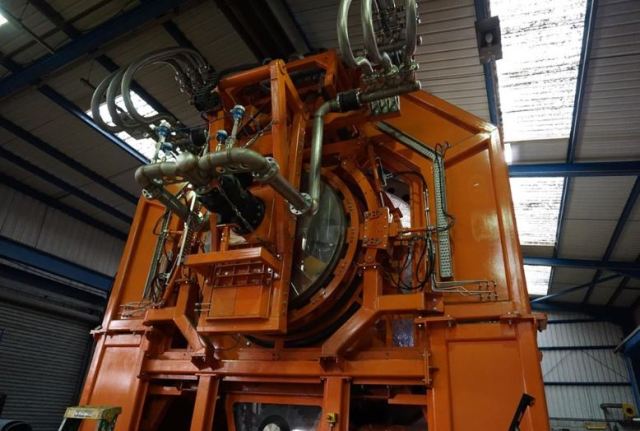Mar 12 2015
New research published today (Wednesday 11th March) by AeroThermal Group shows that pre-treating food waste with acombination of steam and pressure, in a machine known as an autoclave, will double the throughput of an anaerobic digester and significantly reduce the amount of ammonia concentrations by denaturing proteins. The trials have been run over 580 days to date.
 Waste autoclave
Waste autoclave
This increase in performance of the digesters was maximised when the autoclave operated at a temperature of 140oC and the digesters were run at an Organic Loading Rate (ORL) of >5kgVS/m3/day.
The experiments have shown that autoclaving has the effect of producing a feedstock for AD which allows stable digestion at very high loading rates, without the addition of trace elements which could be harmful to the environment.
Stable operations have been achieved at a loading rate as high as 10 kg VS/m3/day with food waste autoclaved at 140oC, while the un-autoclaved feedstock digesters entirely failed at a loading rate of 5 kg VS/m3/day.
Such significant increases in digester performance can be attributed to the denaturing of protein during the autoclaving pre-treatment, which has the effect of reducing the quantity of ammonia generated.
There is a small loss in gas generation due to this denaturing of protein and the caramelisation of sugars but autoclaving at 140OC is probably the optimum temperature as only limited caramelisation will occur and any potential gas loss is more than offset by the advantages of operating stably at higher loading rates.
For the plant operator, this means that by using an autoclave, they can potentially double the throughput of the plant and in doing so, they would double revenues for only a marginal increase in operating costs, since the autoclave uses waste heat from the CHP process. This can only make for an attractive proposition to food waste AD plant operators, in a market where gate fees continue to fall.
The autoclave can easily facilitate the co-processing and blending of different types of waste, since it pasteurises, homogenises and hydrolyses the feedstock in one simple and highly effective process.
Christian Toll, AeroThermal’s CEO, said: “In the past there has been a lot of speculation on the efficacy of pre-treating food waste by an autoclave. Thislong term series of experiments has shown conclusively that using an autoclave will double the throughput of anaerobic digesters.
“This could have a huge impact on every organisation running a digester, as fitting an autoclave into the process, a relatively straightforward process, could revolutionise the world of anaerobic digestion.”
With this ground breaking technology, AeroThermal have previously won the title of ‘Most Innovative Product and Process’ at the prestigious ADBA and Lets Recycle awards.
The AD team at AeroThermal is lead by Tony Kimber BSc (Hons), CEng, who has over 30 years experience and has been responsible for the D&B of approx 60 AD plants, successfully managing EPC contracts and leading multiple site delivery teams.
AeroThermal’scomprehensive testing facility at its laboratory and demonstrator autoclave in Poole, Dorset, is lead by Dr Nigel Bailey MA PhD and Dr Zhenjiang Wang BSc Hons PhD. They use a range of high tech equipment and provide a number of services to the industry, including the examination of waste properties and the evaluation ofthe anaerobic biodegradation of wastes.
AeroThermal troubleshoots digester processes, analysesplant performance and advises options for plant optimisation.
They have 36 laboratory-scale, constantly stirred, digesters available for contract research and provide services such as Biologic Methane Potential (BMP) testing, semi‐continuous anaerobic digestion testing, pH, DS & VS testing, biogas composition, COD, VFA, NH-N and TKN analysis, for any kind of organic wastes or wastewater.
The company has run several hundred scientific trials on many different types of wastes, some in conjunction with Southampton University. The AeroThermal team has now written over 100 reports and has completed waste trials for a number of major waste companies including Biffa, Shanks, Viridor, and New Earth Solutions amongst others.
This programme of experiments builds on AeroThermal’s work on the EU funded Valorgas project, in conjunction with Southampton University, where optimisation of food waste AD plant performance was explored.
http://aerothermalgroup.com/